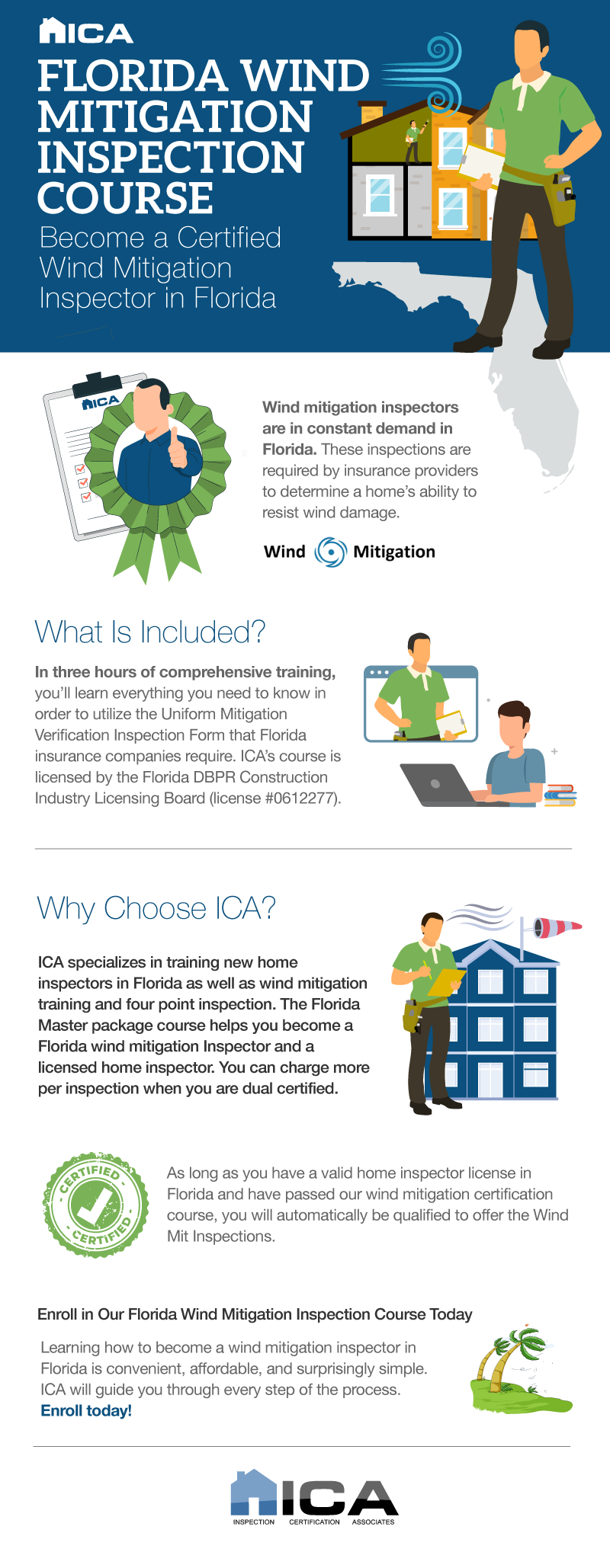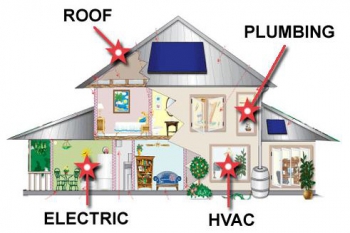A four-point inspection assesses a home’s major systems, including the roof, electrical, plumbing, and HVAC, providing insurers with risk evaluation. It can enable access to more home insurance options as it identifies potential issues.
In Florida, this inspection is crucial for older homes seeking insurance coverage. It assesses the roof, electrical, plumbing, and HVAC systems, making it a significant factor for insurance eligibility and coverage options. Insurers may not provide coverage if these systems are too old or poorly maintained.
The inspection cost, conducted by a licensed inspector in Florida, is essential for obtaining certification and, ultimately, homeowners’ insurance coverage. It can impact insurance eligibility, making it a critical aspect of homeownership in the state.
What Is A Four-point Inspection
A four-point inspection is a comprehensive examination of the four main systems in a home: the roof, electrical, plumbing, and HVAC (Heating, Ventilation, and Air Conditioning) systems. This type of inspection is typically conducted for insurance purposes, providing an overview of the condition and age of these critical home systems.
Definition
A four-point inspection is a specialized assessment that evaluates the condition and age of the roof, electrical, plumbing, and HVAC systems in a home. It is commonly requested by insurance companies to determine the level of risk associated with insuring a property.
Purpose
The primary purpose of a four-point inspection is to assess the overall condition and age of the key systems in a home. This evaluation helps insurance companies in determining the level of risk involved in providing coverage for the property. Additionally, it can guide homeowners in identifying potential issues that may need attention.
Systems Assessed
The systems assessed in a four-point inspection include:
- Roof: The inspector evaluates the age and condition of the roof, looking for signs of damage, wear, or potential issues that may affect its integrity.
- Electrical: This involves examining the electrical wiring, panels, outlets, and overall electrical system to identify any safety hazards or outdated components.
- Plumbing: The inspection focuses on the plumbing system, checking for leaks, corrosion, and other issues that could lead to water damage or mold growth.
- HVAC: The heating, ventilation, and air conditioning system are inspected to ensure proper functionality, efficiency, and safety, as well as to assess the age and condition of the equipment.
Why Is A Four-point Inspection Important
A four-point inspection is a crucial step in assessing the condition of key components in a home, which can directly impact insurance coverage and home insurance options. This inspection focuses on the roof, electrical, plumbing, and HVAC systems, providing valuable insights into the overall condition of the property.
Insurance Coverage
Insurance companies utilize the findings from a four-point inspection to determine the level of risk associated with insuring a property. Failing to meet the standards in any of the four areas can result in limitations or even denials of coverage. This makes the inspection a critical factor in obtaining comprehensive insurance for a home.
Home Insurance Options
For homeowners, a passing four-point inspection can lead to expanded home insurance options. With a well-maintained roof, electrical, plumbing, and HVAC systems, insurance companies are more likely to offer a wide range of coverage plans at competitive rates, providing homeowners with the peace of mind they need.
What Does A Four-point Inspection Cover
A four-point inspection is a vital part of the home inspection process that assesses the four major systems of your house. By examining the roof, electrical, plumbing, and HVAC systems, this inspection helps determine the risk level associated with your home. It is especially common for older homes and can play a significant role in expanding your insurance coverage options.
Roof System
The roof system is an essential component of a four-point inspection. The inspector will thoroughly examine the roof’s condition, looking for signs of damage, deterioration, or leaks. Any issues with the roof can indicate potential risks, such as water damage or structural problems. The inspector will assess the age, material, and overall quality of the roof to determine its condition and whether it meets the insurance company’s standards.
Electrical System
During a four-point inspection, the electrical system is carefully evaluated. The inspector will examine the main electrical panel, wiring, outlets, and any visible electrical components. They will look for outdated or faulty components, improper wiring, and potential safety hazards. The inspection aims to ensure that the electrical system is in good working order and meets the necessary safety standards.
Plumbing System
The plumbing system is another critical aspect of the four-point inspection. The inspector will examine the visible plumbing pipes, fixtures, and connections to evaluate their condition. They will check for leaks, corrosion, water pressure issues, and signs of previous repairs. Ensuring the plumbing system is in proper working condition is essential to prevent potential water damage, pipe bursts, and other plumbing-related issues.
Hvac System
Lastly, the HVAC (Heating, Ventilation, and Air Conditioning) system is thoroughly inspected during the four-point inspection. The inspector will assess the condition and functionality of the heating and cooling equipment, including the furnace, air conditioner, ductwork, and ventilation. They will check for proper installation, maintenance, and potential safety concerns. A well-maintained HVAC system is crucial for maintaining a comfortable and healthy living environment.
Overall, a four-point inspection covers the crucial areas of your home’s roof, electrical, plumbing, and HVAC systems. By identifying any issues or risks associated with these systems, this inspection helps ensure the safety and insurability of your home.
Credit: icaschool.com
What Happens If The Inspection Fails
A four-point inspection is a valuable tool for assessing the major systems of your home, including the roof, electrical, plumbing, and HVAC systems. It helps determine any potential risks or issues that may affect the safety and functionality of your home. However, there is a possibility that your home may fail the inspection if any of these systems are deemed too old or in poor repair.
Impact On Insurance Coverage
When a four-point inspection report indicates that your home’s major systems are in poor condition, it can have an impact on your insurance coverage. Insurers may be hesitant to provide coverage for homes with aged or deteriorating systems due to the increased risk of potential damage or claims.
In such cases, your insurance company may require you to make necessary repairs or upgrades to the failed systems before offering coverage. This ensures that your home is in a satisfactory condition and reduces the likelihood of future insurance claims related to these systems.
Variation Among Insurance Companies
It’s important to note that the response from insurance companies regarding a failed four-point inspection can vary. Each insurance company has its own guidelines and risk assessment criteria when deciding whether to issue coverage. Some insurers may request additional documentation or inspections, while others may simply deny coverage altogether.
It’s advisable to communicate with your insurance agent or provider directly to understand their specific requirements and expectations. They can provide guidance on the necessary steps to address the failed inspection report and work towards obtaining the appropriate insurance coverage for your home.
Remember, a failed inspection does not necessarily mean that your home cannot be insured. It may require some extra effort and investment to address the issues identified in the inspection report, but taking the necessary steps will help ensure the safety and insurability of your home in the long run.
Cost Of A Four-point Inspection
A four-point inspection is an essential evaluation of the major systems in your home, including the roof, electrical, plumbing, and HVAC. This inspection is particularly crucial for older homes as it helps assess the risk associated with these systems and can affect your home insurance options.
Factors Affecting Cost
Several factors can influence the cost of a four-point inspection. Below are some key factors to consider:
- Property Size: The larger the property, the more time and effort it takes to inspect the four major systems, which can impact the overall cost.
- Age of the Home: Older homes often require more scrutiny, as their systems may be more prone to wear and tear. Consequently, the inspection time and potential repairs may affect the cost.
- Accessibility: If certain areas of your home, such as crawlspaces or attics, are difficult to access, it may require additional time and effort to evaluate those systems, influencing the cost.
- Location: Pricing for four-point inspections can vary depending on your location within Florida. Factors like local labor costs and market demand play a role.
Average Cost In Florida
The average cost of a four-point inspection in Florida ranges from $150 to $300. However, it’s important to note that prices may vary based on the factors mentioned above and each inspection company’s pricing structure.
It’s in your best interest to obtain multiple quotes from reputable and licensed inspection professionals to ensure an accurate understanding of the cost for your specific situation.
Credit: homeinspectionsbyneil.com
Credit: www.homespecfl.com
Frequently Asked Questions For 4 Point Inspection Florida
What Is Included In A 4-point Inspection Florida?
A 4-point inspection in Florida includes an assessment of the four major systems of your home: the roof, electrical, plumbing, and HVAC systems. This inspection is commonly done for older homes and can help determine if your home qualifies for certain insurance coverage options.
It is important to ensure these systems are not too old or in poor repair to pass the inspection.
Can You Fail A 4-point Inspection In Florida?
Yes, you could “fail” a 4-point inspection in Florida if your roof, HVAC, electrical, or plumbing are too old or in poor repair. This could lead to some insurers refusing coverage.
Does Citizens Require A 4-point Inspection In Florida?
Yes, citizens in Florida require a 4-point inspection, which evaluates the home’s roof, electrical, plumbing, and HVAC systems. This inspection can impact home insurance coverage options and is commonly performed on older properties. It’s crucial for certifying the condition of these systems for insurance purposes.
How Much Does A 4-point Inspection Cost In Orlando?
The cost of a 4-point inspection in Orlando is typically around $109. 95. This inspection evaluates the roof, electrical, HVAC, and plumbing systems of a home to assess any potential risks. It is commonly done for older homes and can provide more options for home insurance coverage.
Failing the inspection may result in limited coverage options or higher premiums.
Conclusion
A four-point inspection is a crucial step in assessing the risk and condition of the four major systems in your home: the roof, electrical, plumbing, and HVAC. By undergoing this inspection, you can potentially unlock more insurance options for your home.
If any of these systems are old or in poor repair, it may affect your insurance coverage. It’s important to understand that the outcome of the inspection may vary depending on your insurer. Consider getting a four-point inspection to ensure the safety and insurability of your home.


